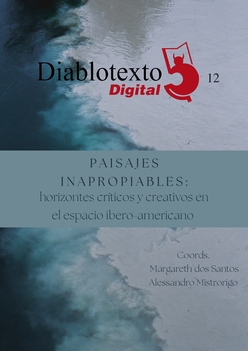Jorge de Lima in the circuit of Afro-Hispanic poetry
DOI:
https://doi.org/10.7203/diablotexto.12.25301Keywords:
Jorge de Lima, Hispano-American dialogues, Afro-Hispanic poetry, Afro-Brazilian poetry, literary circulation Abstract
Abstract
This article seeks to map the Spanish-American dialogues of the Brazilian poet Jorge de Lima (1893-1953), based on a survey of translations and critical reception of his work in Spanish, especially his Afro-regional poetry. At the same time, this approach confronts the Hispanic-American reception with the changes that occurred in his Afro-regional poetry between the 1920s and 1940s, in view of the growing circulation of Afro-Hispanic poetry in Brazil. This article is the partial result of ongoing research, linked to the collective project Ibero-American Cultural Geography: Landscapes, Contact, Languages.
 Downloads
Downloads
 References
References
ANDRADE, Mário de e BANDEIRA, Manuel (2001). Correspondência (org. Marcos Antonio de Moraes). São Paulo: EDUSP, 2001.
ANDRADE, Gênese (2002). Teresa. Revista de Literatura Brasileira, n.3. São Paulo: DLCV/USP (Área de Literatura Brasileira)/Ed. 34, 2002, pp.64-65.
ANTELO, Raul (1992). «Veredas de enfrente: Martinfierrismo, Ultraismo, Modernismo». Revista Iberoamericana 160-161. Pittsburgh: University of Pittsburgh (jul. die 1992): 853-876.
ARTUNDO, Patrícia. Correspondência: Mario de Andrade & escritores / artistas argentinos. São Paulo: EDUSP/IEB, 2013.
BO, Efrain Tomás (1948). "Poesia Afro-Americana", Quilombo: vida, problemas e aspirações do negro, n.º 1, Rio de Janeiro, 09 de dezembro, p.5
CROCE, Marcela (2021). “Verde: Redes Sudamericanas en un Rincón de Minas”. Caderno de Letras, Pelotas, no. 39, pp. 339-352, Jan-Abril 2021
DOMINGUES, Petrônio. Quilombo (1948-1950): uma polifonia de vozes afro-brasileiras. IN: “Revista Ciências & Letras”. n. 44, 2008, pp. 261-289.
EULÁLIO, Alexandre (1992). Escritos. Campinas: Ed. da Unicamp; São Paulo: Ed. da Unesp
GELADO, Viviana (2010). “Primitivismo y vanguardia: las antologías de ‘poesía negra’ hispanoamericana en las décadas del 30 y del 40”. Tinkuy n° 13. Montréal: Section d‘Études hispaniques Université de Montréal, Junio 2010.
ILARI, Rodolfo (1991). “Os Poemas Negros de JL”, in Nossa América, São Paulo, nov.-dez./ 1991, p. 9-13.
KUTZINSKI, Vera M (2012). The world of Langston Hughes: Modernism and translation in the Americas. Ithaca & London: Cornell UP.
LIMA, Jorge de (1950). Obra Poética (org. Otto Maria Carpeaux). Rio de Janeiro, Editora Getulio Costa.
LIMA, Jorge de (1952). Poemas. Rio de Janeiro, Konfino.
LIMA, Jorge de (1956). Poemas. Buenos Aires, Editorial Raigal.
LIMA, Jorge de (1979). La Invención de Orfeo: 30 Sonetos. Trad. Antonio Cisneros Lima: Centro de Estudios Brasileños.
LIMA, Jorge de (1989). Antología Fundamental de Jorge de Lima.Trad. Francisco Cervantes. México: Universidad Autônoma Metropolitana.
LIMA, Jorge de (2014). Poemas negros. São Paulo: Cosac & Naify.
MULLEN, Edward (1988). «The Emergence of Afro-Hispanic Poetry: Some Notes on Canon Formation». Hispanic Review, 56.4 (1988): 435-453.
O GLOBO (1947). Rio de Janeiro, 03 nov.
ROCCA, Pablo y ANDRADE, Gênese (2006). Un dialogo americano: Modernismo brasileno y vanguardia uruguaya (1924-1932).Alicante: Universidad de Alicante.
RODRIGUES, Leandro Garcia (2022). Jorge de Lima e Alceu Amoroso Lima — Correspondência. Rio de Janeiro: Ed. Francisco Alves; Maceió: EdUNEAL.
TORRES-RIOSECO, Arturo (1945). Poesias. Porto Alegre: Ed. da Livraria do Globo.
VIGNALE, Pedro Juan (2002). “Carta para Jorge de Lima”(trad. Gênese Andrade). Teresa. Revista de Literatura Brasileira, n.3. São Paulo: DLCV/USP (Área de Literatura Brasileira)/Ed. 34, 2002pp. 66-67.
VIQUEIRA, Rodrigo (2019). Negrismo, vanguardia y folklore: Representation de los afrodescendientes en la obra de Ildefonso Pereda Valdes (1925-1935). Montevideo: Rebeca Linke editoras.
Downloads
Published
How to Cite
-
Abstract271
-
PDF (Español)141
Issue
Section
License
Licencia de reconocimiento de Creative Commons “Reconocimiento - No Comercia l- Sin Obra Derivada
Authors who publish with this journal agree to the following items:
The authors will keep their copyright and guarantee the journal the right of first publication of their work, which will be simultaneously subject to the Creative Commons license that allows third parties to share the work indicating its author and its first publication in the journal. The authors may adopt other non-exclusive license agreements to distribute the version of the published work (e.g., depositing it in an institutional telematic file or publishing it in a monographic volume), with an acknowledgment of its initial publication in this journal. The authors are allowed and encouraged to disseminate their work through the Internet (e.g., in institutional telematic archives or on their website) before and during the submission process, which can produce interesting exchanges and increase citations of the published work. (See Effect of Open Access)




